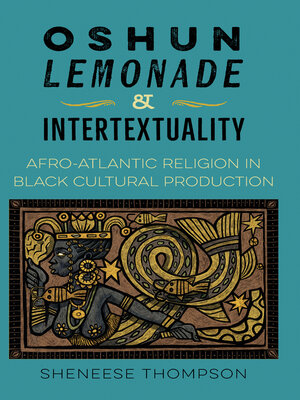Oshun, Lemonade, and Intertextuality
ebook ∣ Afro-Atlantic Religion in Black Cultural Production
By Sheneese Thompson

Sign up to save your library
With an OverDrive account, you can save your favorite libraries for at-a-glance information about availability. Find out more about OverDrive accounts.
Find this title in Libby, the library reading app by OverDrive.



Search for a digital library with this title
Title found at these libraries:
| Library Name | Distance |
|---|---|
| Loading... |
Exploring how Afro-Atlantic religion has been used to portray Black womanhood by writers and artists from Beyoncé to Ntozake Shange
In this book, Sheneese Thompson analyzes works of film and literature to explore how Afro-Atlantic religion intersects with themes of resilience in Black femininity and womanhood. Focusing on Beyoncé's visual album Lemonade, Thompson examines iconography of the Yoruba goddess Oshun, represented by rivers, the color yellow, and other symbols. Thompson argues that Beyoncé's tribute to Oshun creates a narrative of self-repossession amid external definitions, generational trauma, and emotional violence and draws connections to other works that feature similar religious references.
Oshun, "Lemonade," and Intertextuality also explores Beyoncé's album Black Is King, the television series She's Gotta Have It, Julie Dash's movie Daughters of the Dust, Ntozake Shange's novel Sassafrass, Cypress & Indigo, and Jamaica Kincaid's stories in At the Bottom of the River. These works highlight the significance of African traditional religions for the healing and transformation of their characters. Thompson discusses the ways in which Yoruba and Lucumí imagery and practices such as oríkì, or praise poetry, have long been incorporated into Black cultural texts such as these to tell stories of racial and gender-based injustices. In looking at Lemonade together with influential older texts created by Black women, Thompson establishes the use of Afro-Atlantic religion—to think through Black womanhood, to explore self-defined sexuality—as a central tenet of Black women's literature, one that these artists and writers have brought to the global stage.
Publication of this work made possible by a Sustaining the Humanities through the American Rescue Plan grant from the National Endowment for the Humanities.







